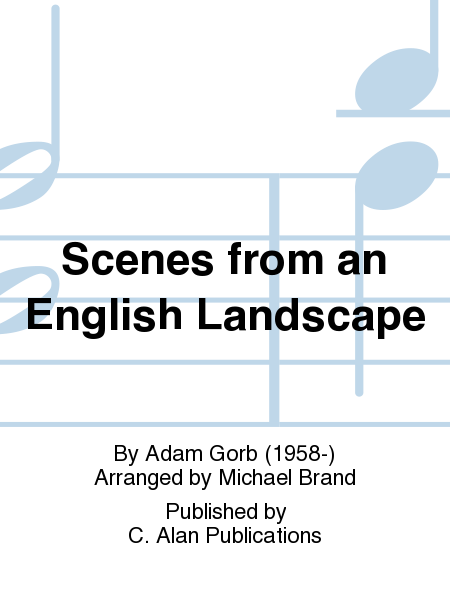Scenes from an English Landscape
-
Ships in 3 to 4 weeks
Details
Description
SKU: CN.S11242
Composed by Adam Gorb. Arranged by Michael Brand. Band Music. Score only. Duration 4:20. Published by G & M Brand Music Publishers (CN.S11242).Scenes from an English Landscape is a brief nostalgic tone poem taking its inspiration from visions of rural England as depicted in the paintings of John Constable, the novels of Thomas Hard, and the music of Gustav Holst and Ralph Vaughan Williams. A chorale-like theme is stated in the brass and then taken up at three times the tempo in the woodwinds. At the end of the work, both versions of the theme are stated together to bring the piece to a triumphant climax.
This is a brief nostalgic tone poem taking its inspiration from visions of rural England as depicted in the paintings of John Constable, the novels of Thomas Hard, and the music of Gustav Holst and Ralph Vaughan Williams. I imagined a community of villagers coming out of church and filling a village square with their vibrant presence. A chorale-like theme is stated in the brass and then taken up at three times the tempo in the woodwinds. At the end o the work, both versions of the theme are stated together to bring the piece to a triumphant climax. Adam Gorb was born in Cardiff and started composing at the age of ten. His first work broadcast on national radio was written when he was fifteen. He studied at Cambridge University (1977-1980) and the Royal Academy of Music (1991-1993) where he graduated with the highest honours including the Principal's Prize. He has been on the staff at the London College of Music and Media, the junior Academy of the Royal Academy of Music and, since 2000 he has been the Head of School of Composition at the Royal Northern College of Music in Manchester . International recognition came in 1994 with the US Walter Beeler Prize for his work Metropolis . With it began what has developed into probably the most important wind ensemble catalogue by a contemporary composer, ranging from extremely challenging to the most accessible, at all technical levels, seized on by players internationally, widely recorded and now absolutely central to the world's wind repertoire. Equally important though are his works for dance, and concert pieces like the chamber orchestral Weimar , the Violin Sonata , a Clarinet Concerto for the Royal Liverpool Philharmonic Orchestra and Diaspora for strings (for the Goldberg Ensemble). Deceptively mainstream at first glance, they display the same inventive brilliance, pulsating sound world, striking use of rhythm and an undogmatic absence of stylistic hang-ups to embrace jazz and serialism in works where power, poetry, irony and pathos, often underlaid by a theatrical and deeply subversive element, coalesce in an integrated, highly individual musical voice. Gorb is also not afraid to draw on the vivid musical heritage of his Jewish roots, sometimes directly, often in a more subsumed or radically creative way. The crucial and consistent feature of Gorb's work though is that it communicates strongly without patronizing players or audiences. He firmly believes that if contemporary music - any music - does not impact on listeners then its message is irrelevant; it is lost.

 Share
Share